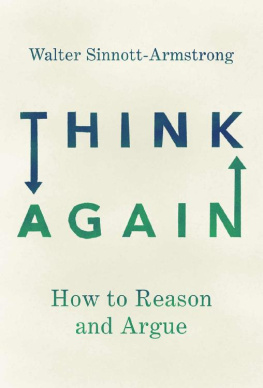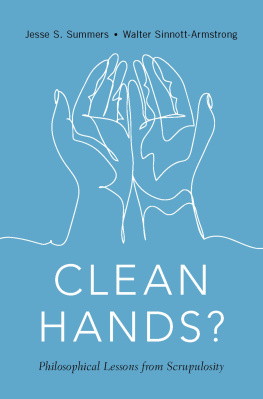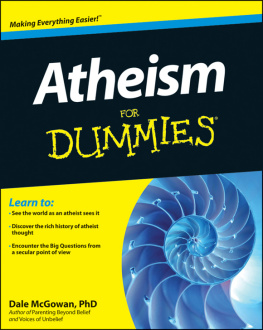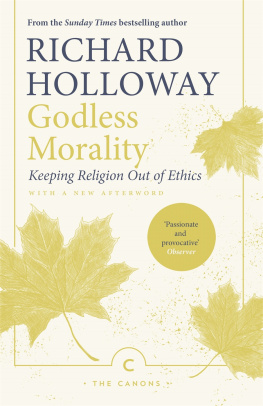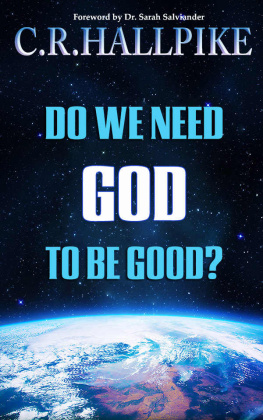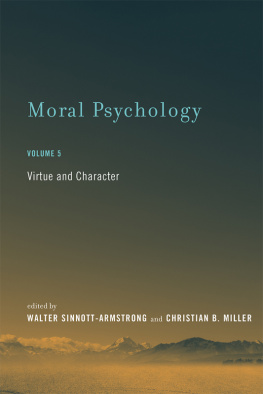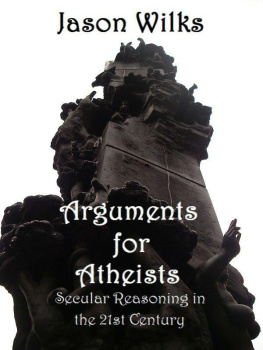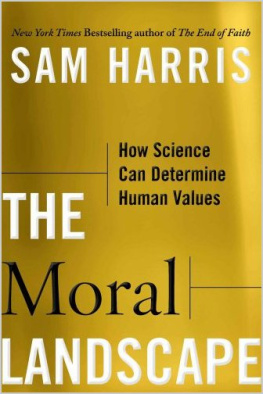Morality Without God?
PHILOSOPHY IN ACTION
Small Books about Big Ideas
WALTER SINNOTT - ARMSTRONG, SERIES EDITOR
This new series publishes short, accessible, lively, and original books by prominent contemporary philosophers. Using the powerful tools of philosophical reasoning, the authors take on our most pressing and difficult questionsfrom the complex personal choices faced by ordinary individuals in their everyday lives to the major social controversies that define our time. They ultimately show the essential role that philosophy can play in making us think, and think again, about our most fundamental assumptions.
MORALITY WITHOUT GOD?
WALTER SINNOTT - ARMSTRONG


Oxford University Press, Inc., publishes works that further
Oxford Universitys objective of excellence
in research, scholarship, and education.
Oxford New York
Auckland Cape Town Dar es Salaam Hong Kong Karachi
Kuala Lumpur Madrid Melbourne Mexico City Nairobi
New Delhi Shanghai Taipei Toronto
With offices in
Argentina Austria Brazil Chile Czech Republic France Greece
Guatemala Hungary Italy Japan Poland Portugal Singapore
South Korea Switzerland Thailand Turkey Ukraine Vietnam
Copyright 2009 by Oxford University Press, Inc.
Published by Oxford University Press, Inc.
198 Madison Avenue, New York, NY 10016
www.oup.com
Oxford is a registered trademark of Oxford University Press
All rights reserved. No part of this publication may be reproduced,
stored in a retrieval system, or transmitted, in any form or by any means,
electronic, mechanical, photocopying, recording, or otherwise,
without the prior permission of Oxford University Press.
Library of Congress Cataloging-in-Publication Data
Sinnott-Armstrong, Walter, 1955
Morality without God? / Walter Sinnott-Armstrong.
p. cm. (Philosophy in action)
ISBN 978-0-19-533763-1
1. Religion and ethics. 2. Atheism. I. Title.
BJ47.S49 2009
170.42dc22
2008055136
1 3 5 7 9 8 6 4 2
Printed in the United States of America
on acid-free paper
To Liz, Miranda, and Nick,
who show how good atheists can be.
CONTENTS
ACKNOWLEDGMENTS
Chapter Five here derives from my chapter, Why Traditional Theism Cannot Provide an Adequate Foundation for Morality? in Is Goodness without God Good Enough? edited by Robert Garcia and Nathan King. Various passages throughout several chapters here have origins in Overcoming Christianity in Philosophers without Gods, edited by Louise Antony. Thanks to these publishers and editors for permission to adapt these materials.
Chapters Four and Six owe a tremendous amount to Bernie Gerts insights in Common Morality and in Morality: Revised Edition. To avoid constant notes, I do not document every idea that I took from Gert, but my great debt will be clear to anyone who knows his work. I am also grateful to Larry Crocker for several of my best quotations as well as numerous helpful discussions and to William Lane Craig, Bruce Little, Dinesh DSouza, and audiences at my debates with Craig, Little, and DSouza for showing me how evangelicals could best reply to my arguments. I also appreciate the financial and (yes!) moral support of Keith Augustine and Internet Infidels, who sponsored my participation in these debates.
Thanks also to David Lamb (who wrote his thesis with me on this topic and provided invaluable research assistance), to Jonathan Haidt (who made me rethink the value of religion), and to Peter Ohlin from Oxford University Press (who gave wise guidance and encouragement in this project among others). I am also grateful to Steven Schragis and John Galvin for enabling me to test my thoughts with a motivated and intelligent slice of the general public at One Day University.
For comments on drafts, I thank Eyal Aharoni, Larry Crocker, Bob Fogelin, Bernie Gert, Jonathan Haidt, Nate King, David Lamb, Andrew Mansfield, Peter Ohlin, and Lucas Swaine.
PREFACE: WHY THIS BOOK?
And now these three remain: faith, hope and love. But the greatest of these is love.
(1 Corinthians 13:13)
Whats up with this title? Why is everything after the first word struck through? Because the goal of this book is to show that there really is no question about morality without God. There is just plain morality.
This point should not be controversial, but it is. Many theists are theists mainly because they believe, for whatever reason, that morality depends on religion. Some of them dont even distinguish morality from religion. The Bible separates faith from love (1 Corinthians 13:13), but many people who profess to follow the Bible see religious faith and morality as inseparable.
Such proclamations confirm the fears of the religious, but they depend on the same refusal to distinguish morality from religion.
This misidentification is pernicious. Our government needs a separation between church and state but not a separation between morality and state. We all know people who do not believe in any God or religion, and it will be very hard to get along with them if we assume that they do not believe in morality. If we do not get this distinction straight, our theories will be confused, and our lives will be contentious.
Thats why I wrote this book: to try to help readers understand why morality has nothing essentially to do with religion. I was motivated partly by my experiences in classrooms. I give lots of talks to college students as well as high school students and the general public. Many of my students quote, If God is dead, everything is permitted, attributed to Friedrich Nietzsche and to Fyodor Dostoevskys character, Ivan Karamazov. The atheists who accept this dogma conclude that morality is subjective. The theists who accept this dogma conclude that atheists are dangerous. I want to show both sides in this debate that they are mistaken, and their blunder results from their shared but erroneous assumption that If God is dead, everything is permitted. This book is an extended refutation of that popular slogan.
You will never convince anyone, and you will anger both sides, my friends warn. That has not been my experience. On the assumption that If God is dead, everything is permitted, people have only two options: They must either (a) believe in God and follow a religion or (b) admit that they and their friends are not morally good, and those who harm them are not morally bad, because nothing is really morally good or bad, right or wrong. Many people long for a third option, and it is easy to see why. Even if they believe in God, they still want a morality that they can share with their friends who do not believe in any God or in the same God that they believe in. Without some shared views about the content of morality, it is hard to see how friendships, communities, and countries can last long.
This issue cannot be ignored. Too many people worry about it. God and morality are among the most prominent and important issues in most of our lives. They are important not just today but also long ago, not just in your own local area but also around the world, not just to theists but also to atheists.
Unfortunately, both topics are also huge. Thick tomes have been devoted to only part of morality. Other thick tomes barely scratch the surface of only part of one religion. And, of course, there are many different religions around the world. I cannot cover them all. I want to keep this book short, clear, and lively. Also, I dont know enough to write about all of the diverse religions. Who does? Each religion requires years of study to fathom. So I need a focus.
Next page

